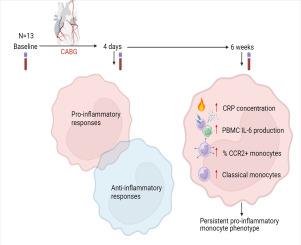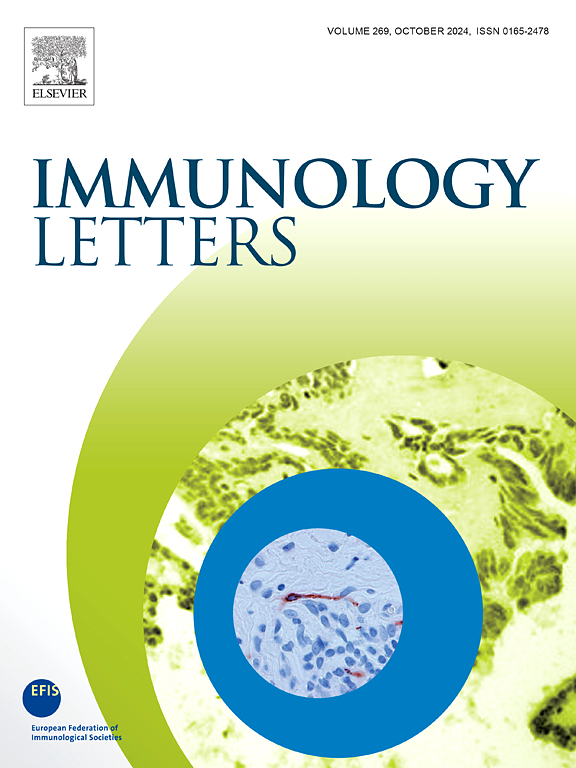Long-term monocyte activation after coronary artery bypass grafting: An exploratory prospective observational study
IF 3.3
4区 医学
Q3 IMMUNOLOGY
引用次数: 0
Abstract
Major surgery such as coronary artery bypass grafting (CABG) is associated with an increased post-operative risk of atherosclerotic cardiovascular events. Cells of the innate immune system can adopt a long-lasting pro-inflammatory and atherogenic phenotype after brief exposure to exogenous or endogenous inflammatory stimuli, a process called “trained immunity”. We hypothesized that the surgery-induced inflammation leads to sustained alterations in monocyte function, which promote the subsequent occurrence of cardiovascular events. Blood from 13 patients undergoing elective CABG was obtained before, 3–7 days (median 4) after, and 6–8 weeks (median 6) weeks after surgery. At 3–7 days postoperatively, circulating C-reactive protein (CRP) concentration, leukocyte counts and ex vivo Peripheral Blood Mononuclear Cell (PBMC) IL-6, TNFα and IL-1Ra production after stimulation (with various inflammatory stimuli) were significantly increased. Simultaneously, there was a reduction in monocyte HLA-DR expression. 6–8 weeks after CABG there was an ongoing systemic pro-inflammatory state with higher CRP concentrations, increased stimulated ex vivo PBMC IL-6 production, changes in monocytes subsets, and a higher expression of CCR2 on monocytes compared to baseline. In conclusion, CABG induces a persistent systemic inflammatory reaction with a sustained activated monocyte phenotype. This might contribute to the increased atherosclerotic cardiovascular event risk observed in cardiac surgery patients.

冠状动脉旁路移植术后的长期单核细胞活化:一项探索性前瞻性观察研究。
冠状动脉旁路移植术(CABG)等大手术与术后发生动脉粥样硬化性心血管事件的风险增加有关。先天性免疫系统的细胞在短暂暴露于外源性或内源性炎症刺激后,会形成一种持久的促炎症和致动脉粥样硬化表型,这一过程被称为 "训练免疫"。我们假设,手术诱导的炎症会导致单核细胞功能的持续改变,从而促进随后心血管事件的发生。我们分别在术前、术后 3-7 天(中位数为 4 天)和术后 6-8 周(中位数为 6 周)采集了 13 名接受择期心血管造影术患者的血液。术后 3-7 天,循环 C 反应蛋白(CRP)浓度、白细胞计数和体外外周血单核细胞(PBMC)IL-6、TNFα 和 IL-1Ra 在受到各种炎症刺激后的产生量均显著增加。与此同时,单核细胞 HLA-DR 的表达也有所减少。CABG 术后 6-8 周,全身持续处于促炎症状态,CRP 浓度升高,受刺激的体外 PBMC IL-6 生成增加,单核细胞亚群发生变化,单核细胞上的 CCR2 表达高于基线。总之,CABG 会诱发持续的全身炎症反应,并伴有持续活化的单核细胞表型。这可能是心脏手术患者动脉粥样硬化性心血管事件风险增加的原因。
本文章由计算机程序翻译,如有差异,请以英文原文为准。
求助全文
约1分钟内获得全文
求助全文
来源期刊

Immunology letters
医学-免疫学
CiteScore
7.60
自引率
0.00%
发文量
86
审稿时长
44 days
期刊介绍:
Immunology Letters provides a vehicle for the speedy publication of experimental papers, (mini)Reviews and Letters to the Editor addressing all aspects of molecular and cellular immunology. The essential criteria for publication will be clarity, experimental soundness and novelty. Results contradictory to current accepted thinking or ideas divergent from actual dogmas will be considered for publication provided that they are based on solid experimental findings.
Preference will be given to papers of immediate importance to other investigators, either by their experimental data, new ideas or new methodology. Scientific correspondence to the Editor-in-Chief related to the published papers may also be accepted provided that they are short and scientifically relevant to the papers mentioned, in order to provide a continuing forum for discussion.
 求助内容:
求助内容: 应助结果提醒方式:
应助结果提醒方式:


